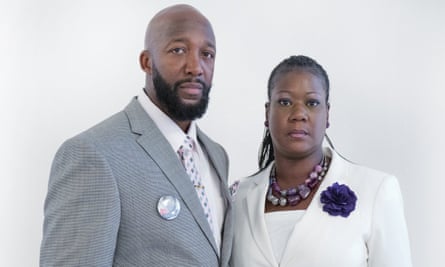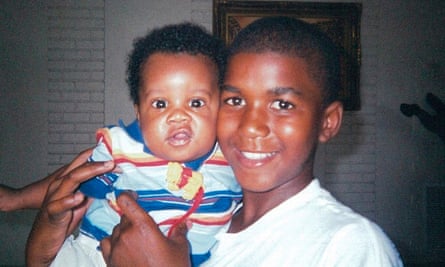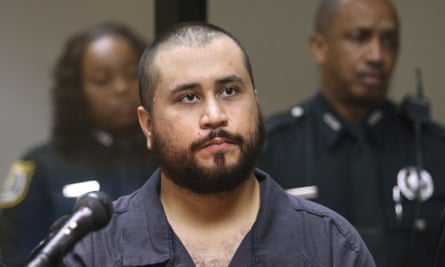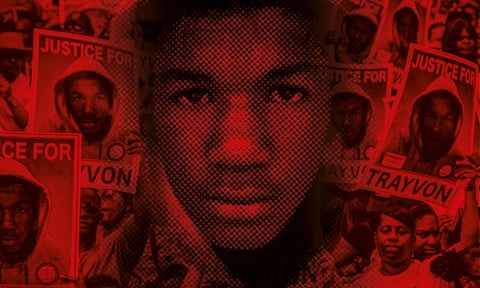This March, five years after being acquitted of the murder of Trayvon Martin, George Zimmerman was back in the news for threatening another African-American man – Shawn “Jay-Z” Carter. “[I said] I would beat him as if I was Solange,” Zimmerman told a local newspaper, referencing Jay-Z’s much-publicised fracas with his sister-in-law, Solange Knowles, in 2014. “And he would find himself coming out of the south side of a gator if he comes to Florida and bothers my family.”
The reason behind the former neighbourhood watch volunteer’s belligerence towards the king of hip-hop was Rest in Power: The Trayvon Martin Story, a new six-part documentary, which Jay-Z executive-produced. The series, made in cooperation with Martin’s parents, Tracy Martin and Sybrina Fulton, examines in forensic, harrowing and often exasperating detail the shooting on 26 February 2012 of the unarmed 17-year-old, which Zimmerman says was in self-defence, while the boy was walking through a gated community in Sanford, Florida. It also explores its momentous repercussions, both personal and national.
And in a tail-swallowing media moment, those repercussions include the documentary-makers’ own run-ins with Zimmerman, who emerges as the opposite of a reformed character. In the intervening years, Zimmerman has been arrested for domestic violence, alleged to have used racist language and seen bragging about killing Martin. He even attempted to auction the gun on eBay.
Dennis Warren, the private investigator hired by the film-makers to contact Zimmerman and his relatives, is currently suing him for stalking. Zimmerman allegedly bombarded Warren with threatening phone calls, texts, voice messages and emails. In a sickening reference to his killing of Martin, Zimmerman boasted to another interviewer: “I know how to handle people who fuck with me. I have since February 2012.”
As it happens, Jay-Z also knows how to handle people who fuck with him. Guesting on DJ Khaled’s recent track Top Off, he spat, “Meanwhile Georgie Porgie sinnin’ and sendin’ me threats/ Save your breath, you couldn’t beat a flight of steps/ Try that shit with a grown man/ I’ll kill that fuckboy with my own hand.”
But Jay-Z’s real response is the docuseries itself. It is both an angry indictment and a gripping real-life legal thriller, but at the same time a necessary examination of a tragedy that exposed the United States’s flaws and faultlines, societal and institutional – in the same way that the murder of Stephen Lawrence did in the UK, two decades earlier.

As with Lawrence, the story gets worse the closer you zoom in. The trial itself is a catalogue of almost farcical errors and oddities, from Zimmerman’s defence lawyer opening with a knock-knock joke, to the excruciating humiliation of Martin’s best friend over her literacy abilities, from a key-witness coroner who proudly announced he had “zero memory” of Martin’s autopsy, to the ill-advised introduction of a life-sized dummy into the courtroom.
And cutting through it all is the palpable pain of Martin’s family – their grief compounded by their sense of injustice. “I trusted that the system was going to work,” says his brother Jahvaris Fulton. “And it didn’t.”
Martin’s killing was the moment the whole country realised the system wasn’t working. In particular, the case brought attention to the controversial “stand your ground” law, backed by the National Rifle Association (NRA), justifying the use of deadly force in self-defence – which has heavily favoured white shooters of black people. In the broader sense, Martin’s case presaged America’s current racial and political divisions. For a brief, wishful moment after the election of Barack Obama, the country imagined itself a post-racial society, but as the final episode of Rest in Power lays out, it was really just a few short steps away from riots in Ferguson, Missouri, the NFL kneeling protests, and the far-right marching through Charlottesville chanting white nationalist slogans with the tacit endorsement of Donald Trump.

“A lot of these issues are in the very bedrock of America. This is about America’s original sin. This is about a global capitalist ideology of racism and where it leads us,” says Jenner Furst, who co-directed Rest in Power with Julia Willoughby Nason. “There was a black president in America, but young African Americans had the sad realisation there were going to be far more Trayvon Martins than Barack Obamas.”
Something else the Trayvon Martin story kick-started was a new era of consciousness, protest and activism in relation to civil rights injustices – what we would now call “Woke America”.
The term now feels overused, but in 2012 few of us either knew it or lived it, which is an indication of how woke we have become. Public outrage at Zimmerman’s acquittal catalysed the formation of Black Lives Matter. Fuelled by social media, the movement has only grown nationwide in the face of subsequent slayings of young black men, often at the hands of law enforcement. But this awakening also permeated into the broader culture – cinema, television and music. As activist Philip Agnew puts it: “It became particularly uncool to not talk about what was going on in the world.”
Jay-Z was never exactly politically disengaged – he performed at Barack Obama’s inauguration, for instance – but he has also begun to address racial justice more overtly in recent years. His 2017 track The Story of OJ, for example, spoke about race and wealth, with an accompanying cartoon video parodying vintage African-American stereotypes. And, like many hip-hop moguls, he has diverted some of his energies and funds towards activism, including producing. Where before he executive-produced movies such as The Great Gatsby and the Annie remake, he has moved on to backing black history projects. “Now is the time to recognize that through our voices we really can effect change,” Jay-Z wrote in The Hollywood Reporter last June.
Furst and Nason’s paths first crossed with Jay-Z via their previous docuseries about Kalief Browder – another innocent young black man whose life ended tragically. A foster child from the Bronx, Browder was arrested in 2010, aged 16, on suspicion of stealing a backpack. He denied any involvement but was jailed at the notoriously violent Rikers Island detention centre in New York. He spent three years there, most of it in solitary confinement, awaiting a trial that was repeatedly deferred and eventually collapsed owing to a lack of evidence or witnesses. Two years after his eventual release, Browder committed suicide.

Jay-Z befriended Kalief Browder after he was freed from jail. He invited Browder to his offices and gave him words of encouragement. So when Furst and Nason approached Jay-Z, having spent six months developing their project with Browder’s family, he immediately agreed to back it, which he did in partnership with the Weinstein Company. With Rest in Power, the situation was reversed – Jay-Z acquired the rights to the book by Trayvon Martin’s parents, and then took them to Furst and Nason.
Being an international superstar, Jay-Z wasn’t exactly hands-on with the series, says Furst. “I would be lying to say we spent every day with Jay-Z, and [that] Beyoncé and I were playing Scrabble together,” says Furst, but the film-makers describe him as “incredibly humble and caring” and “a sophisticated collaborator”.
Furst and Nason are in their mid-30s but they are already veterans of this scene. Furst has spent the past decade working on urban, political documentaries, including Newark-based series Brick City, and the Robert Redford-produced Chicagoland, on which Nason worked as a stills photographer. They are keenly aware of their status as white film-makers operating in this sphere. “The biggest takeaway for us is, as white Americans, we need to do more to surrender our privilege. We need to encourage everyone around us to recognise that, no matter how many years have passed, a white American will never feel the same issues that an African American does.”
Being white did at least enable the film-makers to “infiltrate” the other side of the Trayvon Martin story. White interviewees tended to drop their guard with them, they say. There is a bizarre interview in the final episode, for example, with Andy Hallinan, owner of a Florida gun store that made headlines for refusing to serve Muslims. Zimmerman subsequently befriended Hallinan, and asked him to sell his Confederate flag paintings. Hallinan happily explains to the camera how Zimmerman described African-American people as “monkeys”, though when he argues that the Confederate flag is not a racist symbol, and that the US civil war was fought on other issues apart from slavery, we hear Furst’s voice off-camera asking him to name three other things the war was about. Hallinan is stumped.

Documentaries have already been a key part of the new, politically engaged US, and both Rest in Power and Time: The Kalief Browder Story join a host of recent works dealing with facets of the same American malaise. Ava DuVernay’s 13th and Eugene Jarecki’s The House That I Live In, for example, on the prison-industrial complex and its racist bias. Or the Oscar-winning OJ: Made in America and I Am Not Your Negro, offering a historical perspective on today’s race landscape. Or Whose Streets?, an in-depth study of the Ferguson riots.
Can documentary really make a difference? Absolutely, say Furst and Nason. Kalief Browder’s story prompted Barack Obama to outlaw solitary confinement for juveniles. In April 2017, on the eve of the airing of the final episode of Time: The Kalief Browder Story, mayor Bill de Blasio announced plans to close down the Rikers Island jail complex. Around the same time, legislation was also passed to raise the age of criminal responsibility to 18 in New York, previously one of two US states that prosecuted all 16- and 17-year-olds as adults (in New York, blacks and Hispanics comprise 33% of 16- and 17-year-olds, but 72% of all arrests).
Trayvon Martin’s death has similarly prompted change already, but if there’s one thing Furst and Nason hope their documentary will come to bear on, it is the “stand your ground” laws, which now operate in more than 30 US states.
“Here’s one thing you can focus on that for some reason has escaped all reforms,” says Furst. “And you need to understand how it was formed, the people who helped create it, what their intention was – which was to sell more guns – and how politicians around America rubber-stamped this bill.”
Nason adds: “The constitution was written by essentially white supremacists. It’s very hard to break that chain that has a grip around our criminal justice system today.”
Martin’s parents have become highly active, especially in supporting parents of victims of gun and racial violence. Speaking alongside them in Florida earlier this year, Jay-Z described Trayvon Martin as “a beacon of light”, saying: “His name will sit alongside some of the greats who lost their lives to push our culture forward. The Martin Luther Kings, the Gandhis … ”
It is a reminder that social change often comes about through the telling of personal stories – usually the ones that didn’t have a happy ending.
“One human being, like Trayvon Martin or Kalief Browder, can tell the story of the entire injustice of what it means to be black in our criminal justice system,” says Furst. “And how it’s a continuation of slavery. Black bodies, as they were at the time of slavery, are still a commodity that’s traded and sold, and that’s a really powerful thing to expose to people who are either ignorant of it or in denial of it.”
Rest in Power: The Trayvon Martin Story will air on the Paramount Network later in the year in UK; it will be on the Paramount Network on Monday, 10pm in the US










